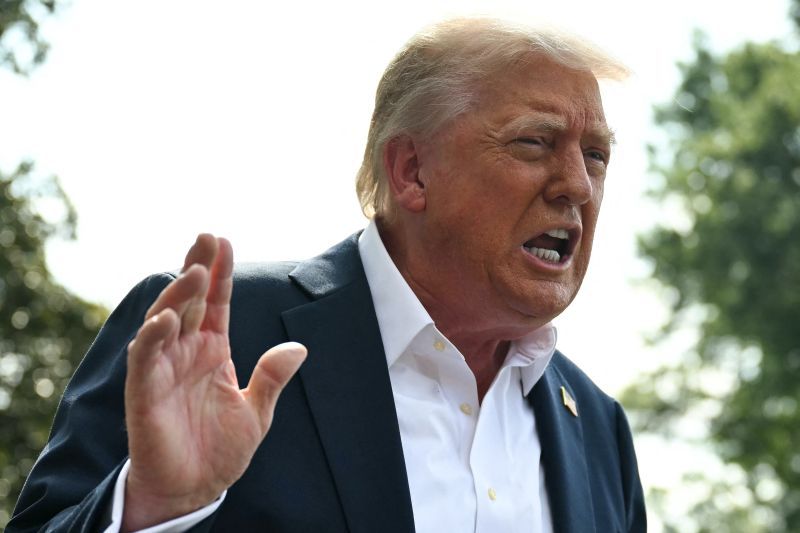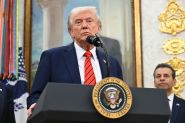- Home
- Middle East
- Trump says Indonesia to Face 19% Tariff Under Trade Deal

US President Donald Trump addresses the press before boarding Marine One on the South Lawn of the White House in Washington, DC, July 11, 2025. ©Andrew CABALLERO-REYNOLDS / AFP
US President Donald Trump said Tuesday that he had struck a trade pact with Indonesia resulting in significant purchase commitments from the Southeast Asian country, following negotiations to avoid steeper tariffs.
Indonesian goods entering the United States would face a 19 percent tariff, Trump said in a post on his Truth Social platform. This is significantly below the 32 percent level the president earlier threatened.
"As part of the Agreement, Indonesia has committed to purchasing $15 Billion Dollars in US Energy, $4.5 Billion Dollars in American Agricultural Products, and 50 Boeing Jets, many of them 777's," Trump wrote.
Boeing shares closed down 0.2 percent after the announcement.
The Trump administration has been under pressure to wrap up trade pacts after promising a flurry of deals recently, as countries sought talks with Washington to avoid the US president's tariff plans.
But Trump has so far only unveiled other deals with Britain and Vietnam, alongside an agreement to temporarily lower tit-for-tat levies with China.
Last week, Trump renewed his threat of a 32 percent levy on Indonesian goods, saying in a letter to the country's leadership that this would take effect August 1.
It remains unclear when the lower tariff level announced Tuesday will take effect for Indonesia. The period over which its various purchases will take place was also not specified.
Trump said on social media that under the deal, which was finalized after he spoke with Indonesian President Prabowo Subianto, goods that have been transshipped to avoid higher duties would face steeper levies.
He separately told reporters that other deals were in the works, including with India, while talks with the European Union are continuing.
Indonesian presidential spokesman Hasan Nasbi said Wednesday the deal was "progress that cannot be called small".
"It is an extraordinary negotiation conducted directly by our President with President Donald Trump," he said, confirming the new 19 percent rate.
He told AFP Prabowo would deliver a statement about the deal on Wednesday afternoon after landing from a visit to Europe.
Indonesia's former vice minister for foreign affairs, Dino Patti Djalal, told a Foreign Policy event Tuesday that government insiders had indicated they were happy with the new deal.
Tariffs drive
Trump in April imposed a 10 percent tariff on almost all trading partners, while announcing plans to eventually hike this level for dozens of economies, including the EU and Indonesia.
But days before the steeper duties, customized to each economy, were due to take effect, he pushed the deadline back from July 9 to August 1. This marked his second postponement of the elevated levies.
Instead, since early last week, Trump has been sending letters to partners, setting out the tariff levels they would face come August.
So far, he has sent more than 20 such letters including to the EU, Japan, South Korea and Malaysia.
Canada and Mexico, both countries that were not originally targeted in Trump's "reciprocal" tariff push in April, also received similar documents outlining updated tariffs for their products.
But existing exemptions covering goods entering the United States under a North American trade pact are expected to remain in place, a US official said earlier.
Trump has unveiled blanket tariffs on trading partners in part to address what his administration deems as unfair practices that hurt US businesses.
Analysts have warned that without trade agreements, Americans could conclude that Trump's strategy to reshape US trading ties with the world has not worked.
"In the public's mind, the tariffs are the pain, and the agreements will be the gain. If there are no agreements, people will conclude his strategy was flawed," William Reinsch, senior adviser at the Center for Strategic and International Studies, previously told AFP.
By Beiyi SEOW/AFP
Read more



Comments